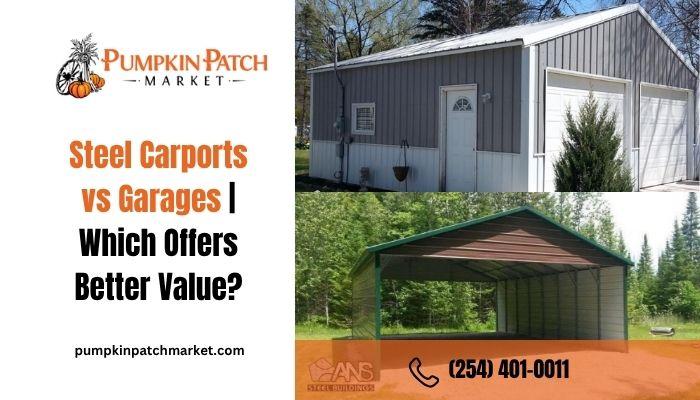Trying to decide between a steel carport or a garage to protect your vehicle, tools, or outdoor gear? Both offer strong, low-maintenance protection, but the right choice comes down to what matters most to you: cost, coverage, security, or flexibility.
This guide breaks down the key differences between steel carports and garages to help you get the best value for your needs. Whether you’re looking for quick coverage, secure storage, or something in between, we’ll help you weigh the pros and cons clearly.
From weather protection to long-term savings, let’s explore which option delivers more, without overcomplicating your decision.
Understanding Steel Carports and Garages
Steel carports are open-sided structures with a roof supported by posts, designed to protect vehicles or equipment from sun, rain, or snow. They’re cost-effective and quick to install, ideal for basic coverage. Steel garages, fully enclosed with walls, doors, and often windows, provide secure storage for vehicles, tools, or hobbies.
Both are built with galvanized or powder-coated steel for rust resistance and longevity. Your choice depends on how much protection and functionality you need. For high-quality options, visit Pumpkin Patch Market.
Comparison of Key Features
To clarify the differences, here’s a table summarizing the main aspects of steel carports and garages:
| Feature | Steel Carport | Steel Garage |
| Cost | $1,000-$5,000 | $5,000-$15,000 |
| Weather Protection | Shields from sun, rain, snow; open sides | Full protection from all weather conditions |
| Security | Minimal; exposed to theft | High; lockable doors and windows |
| Installation Time | 1-2 days, DIY possible | 3-7 days, often professional |
| Versatility | Vehicles, gatherings, equipment | Workshops, storage, gyms, parking |
| Maintenance | Low; clean debris, check anchors | Low; clean, inspect doors/seals |
| Space Requirements | Smaller footprint, gravel pad | Larger, needs concrete slab |
| Property Value Impact | Minimal | Increases value as permanent structure |
This table highlights why carports suit budget-conscious needs, while garages offer broader functionality. Let’s dive deeper into each factor.
Weather Protection
Steel carports block sun, rain, and snow, preventing UV damage or ice on vehicles. Their open sides, however, allow wind-driven rain or debris to reach contents, limiting protection in storms. They’re best for mild climates or temporary use.
Steel garages provide complete weatherproofing, shielding against rain, hail, and extreme temperatures. Insulated models maintain stable interiors, protecting sensitive items like electronics or classic cars. For robust designs, check out Steel Structures.
Security and Privacy
Carports offer little security due to their open design, making them less suitable for valuables prone to theft. Privacy is minimal, which may not work in crowded neighborhoods. Anchoring and basic locks can deter casual issues but aren’t robust.
Garages excel in security with lockable doors and windows, safeguarding vehicles, tools, or equipment. They also provide privacy, ideal for workshops or personal projects. This makes garages a top choice for protecting assets.
Cost and Installation
Steel carports are budget-friendly, costing $1,000-$5,000 for standard models. Prefabricated kits allow quick setup, often in a day, with minimal labor costs. They’re perfect for those seeking affordable, immediate protection.
Steel garages range from $5,000 to $15,000, reflecting their enclosed design and features like insulation or doors. Installation takes longer, typically requiring a concrete foundation and professional help, adding to costs. Their higher price suits long-term, multi-use needs.
Versatility and Customization
Carports are flexible for covering cars, boats, or hosting outdoor events, but their open structure limits secure storage or workspace potential. Customization includes roof styles (flat, gabled) or partial side panels. They’re great for low-commitment uses.
Garages offer extensive versatility, supporting workshops, gyms, or Sheds-like storage with options for shelving, insulation, or skylights. Their enclosed design accommodates diverse needs, making them a valuable addition for hobbyists or homeowners.
Space and Property Requirements
Carports need less space, fitting in driveways or side yards with a simple gravel or concrete pad. Their smaller footprint suits compact properties, and many areas don’t require permits for smaller models. This makes them easy to integrate.
Garages demand more space and a solid foundation, like a concrete slab, to ensure stability. Zoning laws or permits may apply, especially for larger structures. Plan for clearance around the garage for access and ventilation.
Maintenance and Durability
Both carports and garages, made from quality steel, resist rust, pests, and fire with minimal care. Carports require occasional cleaning to clear debris from open sides and anchor checks after storms. Their simplicity keeps upkeep straightforward.
Garages need similar cleaning, plus inspections of door hinges or window seals. Insulated models may require weatherstripping maintenance. Both last 20-30 years with care, but garages better protect contents, adding value.
Aesthetic and Property Value
Carports blend into open spaces with sleek or rustic designs, but their temporary nature adds little to property value. They’re functional and unobtrusive, ideal for practical needs without altering aesthetics significantly.
Garages boost curb appeal and property value with customizable finishes, like wood-look siding or windows. Seen as permanent improvements, they attract buyers seeking secure storage. For unique steel setups, explore Chicken Coops for complementary structures.
Which Offers Better Value?
Value depends on your goals. Steel carports are the go-to for affordability, quick setup, and basic weather protection, perfect for vehicles or equipment in mild climates. They’re ideal for budget-conscious homeowners or temporary needs.
Steel garages provide greater value for secure, multi-purpose spaces, especially in harsh weather or for long-term use. Their versatility and property value boost offset the higher cost, making them a smarter investment for diverse needs.
Conclusion
Deciding between a steel carport and garage comes down to your budget, protection needs, and property goals. Carports offer affordable, quick coverage for vehicles or equipment, while garages deliver security, versatility, and lasting value. Consider weather conditions, storage requirements, and space constraints to choose wisely. Both, when crafted from quality steel, ensure durability and low maintenance. By aligning your choice with your needs, you’ll enhance your property’s functionality and appeal. For trusted steel solutions, browse Steel Structures to find your ideal structure.
- Visit Pumpkin Patch Market, Middlebury, IN, location or call (574) 825-3312 to explore steel carports and garages.
- Stop by our Bourbon, IN, store or call (574) 858-9210 to discuss custom steel structure solutions.
FAQs:
Are steel carports cheaper than garages?
Yes, carports cost $1,000-$5,000, while garages range from $5,000-$15,000. Carports use less material and install faster, reducing costs.
Do I need a permit for a steel carport or garage?
Carports often don’t require permits if small, but garages typically do due to foundations and permanence. Always check local regulations.
Can a steel carport be upgraded to a garage?
Some carports allow wall additions to form a garage, but confirm design compatibility. A new foundation may be needed for full enclosure.
How durable are steel carports and garages?
Both last 20-30 years with minimal maintenance, like cleaning and rust checks. Garages offer better content protection, enhancing their value.
Are steel garages suitable for uses beyond parking?
Yes, garages support workshops, gyms, or storage with customizable features like insulation or shelving. Carports are less versatile due to open sides.


